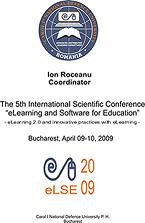ELEARNING AND MODERN LEARNING MANAGEMENT SYSTEMS
ELEARNING AND MODERN LEARNING MANAGEMENT SYSTEMS
Author(s): Emad El Din Mahmoud Eid, Mohamed Mostafa MohamedSubject(s): Education
Published by: Carol I National Defence University Publishing House
Summary/Abstract: E-Learning often sits badly with traditional software project management techniques. Projects are often small and lightweight with a short, iterative lifecycle, often based on existing templates. In these circumstances, full-scale software project management techniques are over the top. The technique sees the ADDIE (Analyze, Design, Develop, Implement, Evaluate) instructional design methodology combined with the IPECC (Initialize, Plan, Execute, Control, Close) project management technique. We break the project lifecycle into stages, outlining the purpose, information requirements, decisions and documentation required at each stage. Learning management is an evolution of the processes and systems that schools and companies developed to register students in courses and keep track of student records. Today there are many more learning options. Any students or employees can take courses as part of a formal curriculum, courses on-line, courses to fulfill certification requirements, Access a single learning object as a way of brushing up on something before a meeting, Exchange e-mails with a mentor on a regular basis, Collaborate with other learners in on-line meetings and via e-mail, Take courses both in your company or institution or off-site at another company or institution, Do an Internet search for information, Even withdraw a book from a library. Any stander learning management system (LMS) enables and keeps records for all of these activities. It can Present a catalog of both on-line and classroom learning opportunities to the students; launch e-learning courses; allow participants to sign up for these opportunities when convenient; allow administrators to schedule the courses and assign instructors, facilities, and equipment to a course; provide the means to keep track of course attendance and results; and maintain a database of courses taken and results for each individual in the organization. Also for More sophisticated systems may do link to human resources information management (HRIS) and enterprise resource planning (ERP) systems to conduct skill gap analysis, performance tracking, competency mapping, etc. provide e-commerce capabilities provide dashboards to make return on investment (ROI) calculations.
Journal: Conference proceedings of »eLearning and Software for Education« (eLSE)
- Issue Year: 5/2009
- Issue No: 01
- Page Range: 143-150
- Page Count: 8
- Language: English

